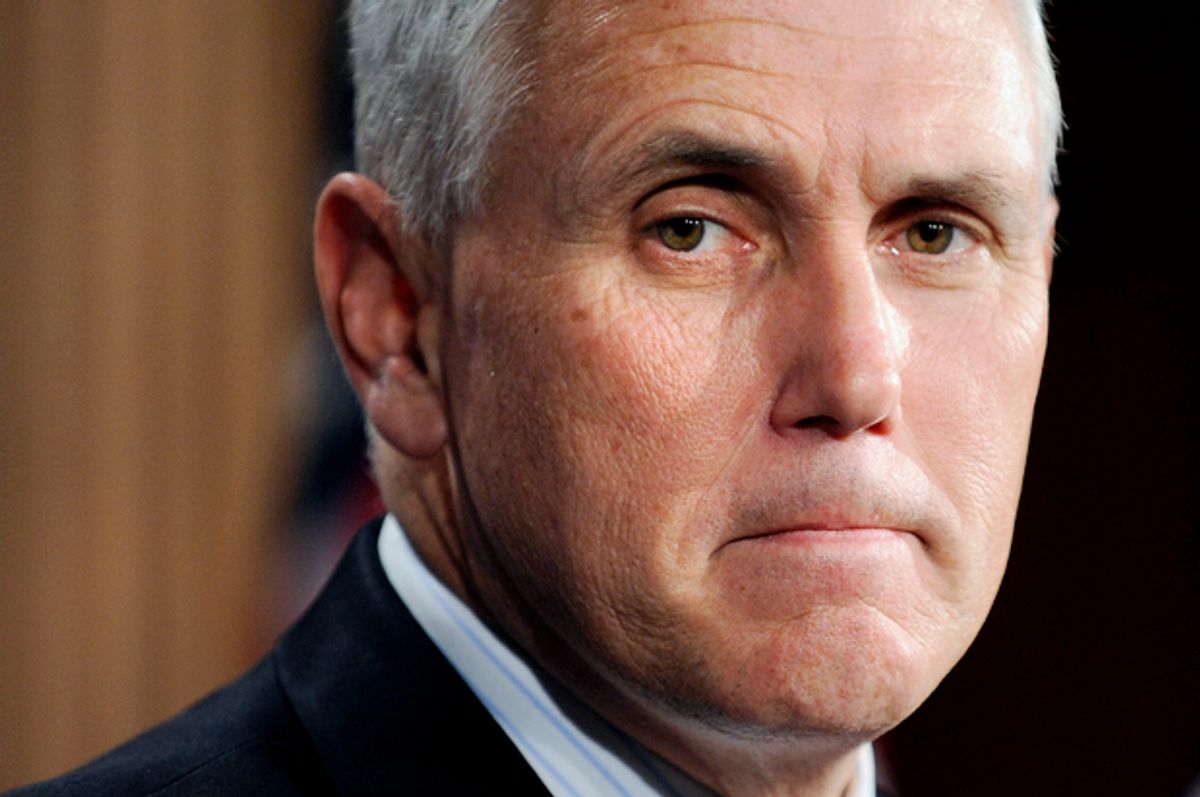Indiana Gov. Mike Pence’s stunning change of mind, promising to “fix” his state’s bigoted “religious freedom” law only two days after stridently defending it on national television, is largely due to the economic backlash by business leaders against the legislation. From Apple to Salesforce to home grown, Republican-led Angie’s List, top corporations made clear they will punish the state for transgressing the rights of LGBT Americans. It was awe-inspiring, and it nudged Arkansas Gov. Asa Hutchinson to reverse himself and announce he won't sign that state's version of the Indiana law (as did pressure from WalMart).
But Pence’s quick “religious freedom” turnaround made me think of another notorious Indiana law that has gotten no pushback from the business community over the years: Its 2005 voter identification legislation that paved the way for a rollback of voting rights across the country.
It was Indiana’s groundbreaking law that the Supreme Court upheld in 2008, affirming the decision of a federal district court that turned back civil rights challenges to the new restrictions. Since then, the judge who wrote the 2007 district court decision, conservative Richard Posner, has essentially admitted that he made a mistake. In his 2013 book “Reflections on Judging,” Posner wrote: “I plead guilty to having written the majority opinion” in Crawford vs. Marion County, Ind. He acknowledged that the Indiana legislation was “a type of law now widely regarded as a means of voter suppression rather than of fraud prevention.”
Although Posner quickly wrote that he hadn’t “recanted” his decision, but merely reflected on what the succeeding years and new voter restrictions had taught him, he’s become a leading voice in calling the bills pioneered by Indiana exactly what they have become: a 21st century version of poll taxes and literacy tests, designed and marshaled by Republicans to thwart Democratic constituencies.
In a blistering dissent from a district court decision that refused to overturn Wisconsin’s voter ID law last year, Posner described the hardship involved in obtaining identification (and confessed that if he weren’t a federal judge he might not know how to go about it himself.) At an estimated cost of $75 to $175, obtaining voter ID was more expensive than "the $1.50 poll tax outlawed by the 24th amendment in 1964," Posner wrote.
Ironically, Posner also wrote the opinion striking down Indiana’s gay marriage ban last year – which helped inspire the anti-gay “religious freedom” law that’s gotten the state into such a mess. The Reagan-appointed judge has shown a willingness to rethink conservative orthodoxy as the Republican Party has moved further to the fringe.
Some of the business community has evolved along with Posner. But it has not joined his effort to push back against restrictions on voting rights. It’s hard not to assume that’s because corporate America is not as concerned about the rights of potential “customers” who can’t afford $75 to obtain a birth certificate or other form of valid identification. By definition, the people whose voting rights are being curtailed don’t have the economic clout to call for boycotts against their states.
Business didn’t rise up over Pence’s last bone-headed wingnut move, either: reversing his administration’s plans to expand Indiana’s preschool programs to thousands of low-income children with tens of millions of federal dollars, just last October. Pence’s own team had backed the expansion, but he spiked the application, citing vague concerns about “strings” attached to the federal money.
Indiana is also the state, by the way, that just sentenced a woman to 20 years in prison for "feticide," becoming the first state to imprison a woman for what it claims was an unsuccessful attempted abortion.
Don’t get me wrong: I’m happy that the movement for LGBT rights has grown so broad that businesses, even those run by Republicans, see an economic reason to get on board. It’s also worth remembering that this battle is still not won – not in Indiana, which hasn’t yet made substantive moves to change its bad law, or nationally. We can’t let up.
But it’s clear that corporate America’s benevolence only extends so far. It’s great that Apple’s Tim Cook, who happens to be gay, lent his voice to the protest against the Indiana law. But if Apple would pay the federal taxes it owes, we could vastly expand preschool programs nationwide. If corporate America would join the fight to restore the Voting Rights Act, the bill in Congress might have more than one Republican supporter (Wisconsin Rep. James Sensenbrenner still stands alone). If businesses punished the rightward drift of the Republican Party by withholding campaign contributions, we’d see more action on hiking the minimum wage and expanding infrastructure (two issues that used to be bipartisan), and maybe even fighting income inequality.
The LGBT rights struggle is powered by righteousness, smart and big-hearted advocacy, the community’s economic clout – and the fact that it doesn’t cost businesses a dime. Other civil rights issues lag behind because they don't enjoy some of those assets.

Shares